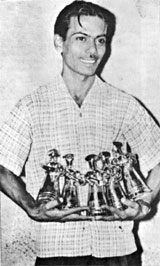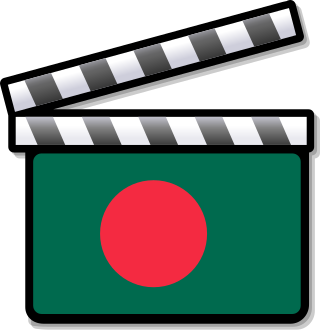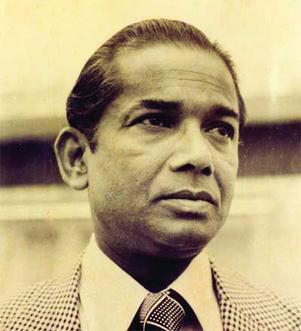
Mohammad Zahirullah, known as Zahir Raihan, was a Bangladeshi novelist, writer and filmmaker. He is most notable for his documentary Stop Genocide (1971), made during the Bangladesh Liberation War. He was posthumously awarded Ekushey Padak in 1977 and Independence Day Award in 1992 by the Government of Bangladesh.

Sumita Devi was a Bangladeshi actress. In 45 years of her career, she acted in around 200 films and 150 radio and television dramas. She was an artist at the Swadhin Bangla Betar Kendra in 1971.

The Cinema of Bangladesh is a diverse and vibrant entity, consisting of films produced across various regions, each contributing its unique linguistic and cultural perspective. Beyond the dominant Dhaka based Bengali-language film industry Dhallywood, which is a portmanteau of "Dhaka" and "Hollywood", Bangladesh is home to cinema in several other languages and dialects. For instance, Chakma cinema from Bandarban, Garo cinema from Sherpur, Meitei and Sylheti cinema from Sylhet, Chatgaiya cinema from Chattogram. These regional cinemas play a crucial role in preserving and promoting the linguistic and cultural heritage of the country. The dominant style of Bangladeshi cinema is melodramatic cinema, which developed from 1947 to 1990 and characterizes most films to this day. Cinema was introduced in Bangladesh in 1898 by the Bradford Bioscope Company, credited to have arranged the first film release in Bangladesh. Between 1913 and 1914, the first production company, Picture House, was opened. A 1928 short silent film titled Sukumari was the first Bengali-produced film in the region. The first full-length film, The Last Kiss, was released in 1931.

Rosy Afsary was an actress in the Bangladeshi film industry. She was awarded the Bangladesh National Film Award for Best Supporting Actress in its first ceremony in 1975 for her role in the film Lathial.

Sangam is a Pakistani Urdu film released in 1964.

Khan Ataur Rahman was a Bangladeshi film actor, director, producer, screenplay writer, music composer, and singer, best known for his role in the film Jibon Theke Neya (1970). He received the Bangladesh National Film Award for Best Screenplay for the films Sujon Sokhi (1975) and Danpite Chhele (1980). He was awarded Ekushey Padak posthumously in 2003 by the Government of Bangladesh.

Subhash Dutta was a Bangladeshi filmmaker, theater and film actor. He started his career as a commercial artist.

Anwar Hossain was a Bangladeshi actor, best known for playing the role of Siraj ud-Daulah in the Bengali film Nawab Sirajuddaula (1967). He appeared in nearly 500 movies in his 50-year career. He is often referred as The Uncrowned Nawab of Bengali films. He received the Bangladesh National Film Award for Best Actor for his role in the film Lathial (1975) and Best Supporting Actor awards for the films again for Golapi Ekhon Traine (1978) and Dayi Ke? (1987).

Khalil Ullah Khan was a Bangladeshi film and television actor. He earned Bangladesh National Film Award for Best Supporting Actor for his role in Gunda in 1976.
Salahuddin was a Bangladeshi filmmaker.

Kancher Deyal is a 1963 Bengali-language Pakistani film. It was written and directed by Zahir Raihan. Anwar Hossain, Sumita Devi, Khan Ataur Rahman in the lead role and others supporting role were portrayed in the film.
Mohiuddin Ahmad is a Bangladeshi film director, writer and producer. In 1982, he won the Bangladesh National Film Award for Best Director for the film Boro Bhalo Lok Chhilo and in 1991 he won Bangladesh National Film Award for Best Story for the film Padma Meghna Jamuna.










